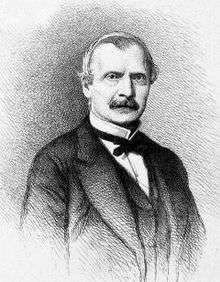Auguste Mermet
Auguste Mermet (5 January 1810, in Brussels – 4 July 1889, in Paris) was a French opera composer.

Biography
He was the son of an officer in the Grande Armée[1] and originally intended to have a military career, but after learning to play the flute and later privately studying music composition with Jean-François Le Sueur and Fromental Halévy, abandoned the military for music.[2][3]
In Mermet's youth, he composed a 2-act opéra-comique, La bannière du roi with a libretto by Pierre Carmouche, which was first performed at Versailles in April 1835.[3]
Alexandre Soumet then accepted to transform for him his tragedy about Saul into a libretto of drame lyrique. Auguste Mermet composed the score of this work, which was performed without success at the Paris Opera in 1846 under the title of Le roi David with Rosine Stoltz as David.[2]
His Roland à Ronceveaux, for which he composed the lyrics and the music, was staged in 1864[3] after Napoléon III imposed the opera on the management of the theater. Roland had received 65 performances by 1867, a success at least partly due to its patriotic flavor and spectacular staging.[3]
Mermet also composed a four-act opera, Jeanne d'Arc, to his own libretto based on a play by Jules Barbier,[3] which was the first premiere to be presented at the Palais Garnier (5 April 1876). The ballet was choreographed by Louis Mérante. Gabrielle Krauss sang the title role, and Jean-Baptiste Faure was Charles VII, but the opera received only 15 performances, the last on 27 November.[4] Tchaikovsky used Mermet's libretto as one of the sources for his opera The Maid of Orleans.[3]
Hugh Macdonald, writing in The New Grove Dictionary of Opera, described his music as "direct, attractive, unadventurous, and noisy" and as modeled on Meyerbeer and Halévy.[3]
Works

- La Bannière du roi (April 1835, Versailles)
- Le Roi David (3 June 1846, Paris Opera, Salle Le Peletier)
- Roland à Roncevaux (3 October 1864, Paris Opera, Salle Le Peletier)
- Jeanne d'Arc (5 April 1876, Paris Opera, Palais Garnier)
References
Notes
- Cairns 1999, p. 733.
- Fétis 1880, pp. 212–213.
- MacDonald 1992.
- Wolff 1962, p. 125.
Sources
- Cairns, David (1999). Berlioz. Volume Two. Servitude and greatness 1832–1869. Berkeley, California: University of California Press. ISBN 978-0-520-22200-7.
- Fétis F-J. (1862). Biographie universelle des musiciens (in French), supplement, volume 2. Paris: Firmin-Didot. View at Google Books.
- Macdonald, Hugh (1992). "Mermet, Auguste" in Sadie 1992, vol. 3, p. 343.
- Sadie, Stanley, editor (1992). The New Grove Dictionary of Opera (4 volumes). London: Macmillan. ISBN 978-1-56159-228-9.
- Wolff, Stéphane (1962). L'Opéra au Palais Garnier (1875–1962). Paris: Deposé au journal L'Entr'acte OCLC 7068320, 460748195. Paris: Slatkine (1983 reprint) ISBN 978-2-05-000214-2.